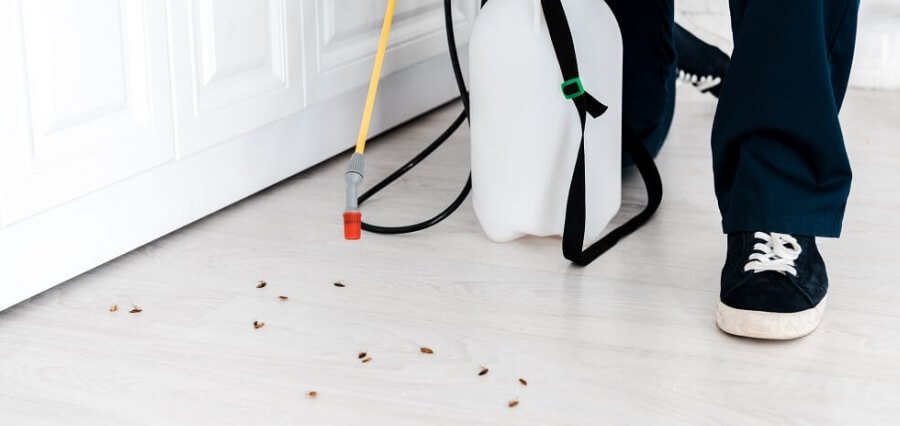Pest Control Clovis Solutions: Specialist Provider at Your Front door
Pest Control Clovis Solutions: Specialist Provider at Your Front door
Blog Article
Understanding the Numerous Methods to Parasite Control: A Comprehensive Guide

Natural Insect Control Techniques
Utilizing eco-friendly techniques such as buddy growing and organic insect control is essential for efficiently taking care of parasites in farming setups. Buddy planting entails growing different plants in proximity to discourage insects, boost nutrient uptake, and boost total crop wellness. For example, growing marigolds alongside tomatoes can help fend off nematodes. Intercropping maize with legumes can interfere with the reproduction patterns of bugs like corn borers.
Biological parasite control includes introducing all-natural predators or virus to manage pest populaces. Ladybugs, as an example, feed upon aphids, regulating their numbers without the requirement for chemical pesticides. Another instance is the use of Bacillus thuringiensis (Bt), a bacterium that targets details insect bugs while being harmless to human beings, animals, and beneficial pests.
These environment-friendly methods not just decrease the reliance on artificial pesticides however also assist preserve biodiversity and dirt health and wellness. By incorporating all-natural pest control approaches right into agricultural techniques, farmers can attain sustainable pest management while decreasing negative influences on the atmosphere.

Chemical Insect Control Solutions
In enhancement to all-natural parasite control techniques, the use of chemical pest control remedies plays a significant role in successfully taking care of pest populaces in agricultural environments. Chemical bug control services are developed to target certain parasites that may cause comprehensive damages to plants. These options often include synthetic pesticides that are developed to remove bugs promptly and successfully.
Among the essential advantages of chemical parasite control solutions is their performance in managing pest invasions on a huge scale. Farmers can use these solutions making use of various methods such as splashing, airing out, or seed therapy to secure their crops from harmful bugs, weeds, and illness. Furthermore, chemical bug control services are relatively easy to use and can give fast results, helping farmers secure their yields and reduce economic losses.
However, it is important to make use of chemical insect control solutions judiciously to decrease possible adverse effect on the setting, non-target organisms, and human wellness. Appropriate application techniques, adherence to security guidelines, and regular surveillance are crucial to guarantee the accountable use of chemical parasite control options in farming practices.
Biological Bug Control Approaches
Organic parasite control approaches utilize all-natural killers or pathogens to manage insect populations in agricultural setups properly. One usual biological control technique is the intro of all-natural adversaries, such as ladybugs or parasitical wasps, to target details pests.
Another biological control technique includes utilizing pathogens like bacteria, viruses, or fungi to infect and kill insects. These microbial representatives can be splashed on plants or introduced right into the dirt to combat various pests without damaging advantageous insects or various other wild animals. Furthermore, the use of pheromones to disrupt the breeding patterns of parasites is one more efficient biological control approach. By hindering their reproduction, this approach aids to decrease insect populations without the demand for chemical intervention. In general, biological parasite control techniques provide a sustainable and targeted option to pest management in farming.
Integrated Bug Monitoring (IPM)
Integrated Insect Monitoring (IPM) is a comprehensive method that incorporates different parasite control techniques Related Site to effectively handle my company and decrease pest populations in farming systems. IPM concentrates on long-term avoidance of parasites through a mix of organic, cultural, physical, and chemical control approaches. By incorporating these different techniques, IPM intends to reduce reliance on chemical pesticides, lessen ecological impact, and promote sustainable bug management practices.
One secret facet of IPM is making use of biological controls such as natural killers, bloodsuckers, and pathogens to regulate insect populaces. This approach harnesses the power of nature to maintain a balance in between parasites and their natural enemies without causing damage to the atmosphere.
In addition, IPM entails social practices like crop rotation, habitat, and cleanliness control to produce undesirable conditions for bugs and interrupt their life cycles. Physical controls such as obstacles, catches, and mulches are also utilized to prevent pest problems.
Mechanical and Physical Insect Control Techniques
Making use of non-chemical approaches, such as physical and mechanical bug control methods, is a critical facet of detailed bug administration techniques, building on the structure of Integrated Bug Administration's holistic strategy. Mechanical bug control includes the use of physical obstacles or catches to stop bugs from accessing and damaging plants or structures. This method can consist of methods like mounting displays on windows, making use of row covers in farming, or using sticky traps to capture insects.
Physical parasite control techniques, on the other hand, emphasis on directly removing insects through physical ways. Making use of heat therapies to eradicate bed insects or vacuuming up parasites like spiders or ants can be effective methods to take care of problems without the use of chemicals. By including these mechanical and physical parasite control techniques right into an Integrated Parasite Administration strategy, people and experts can lower reliance on pesticides while still effectively lessening and taking care of pest populations damage.
Final Thought

In enhancement to natural pest her explanation control approaches, the usage of chemical pest control remedies plays a substantial function in efficiently taking care of pest populaces in agricultural settings.One of the key benefits of chemical insect control solutions is their performance in controlling parasite invasions on a huge scale.Integrated Pest Administration (IPM) is a comprehensive strategy that combines numerous insect control approaches to successfully manage and reduce pest populaces in agricultural systems.Making use of non-chemical methods, such as physical and mechanical parasite control strategies, is a critical facet of comprehensive pest management approaches, building upon the foundation of Integrated Parasite Administration's holistic method. By incorporating these physical and mechanical insect control methods right into an Integrated Insect Administration strategy, experts and people can reduce reliance on pesticides while still successfully lessening and taking care of pest populaces damage.
Report this page